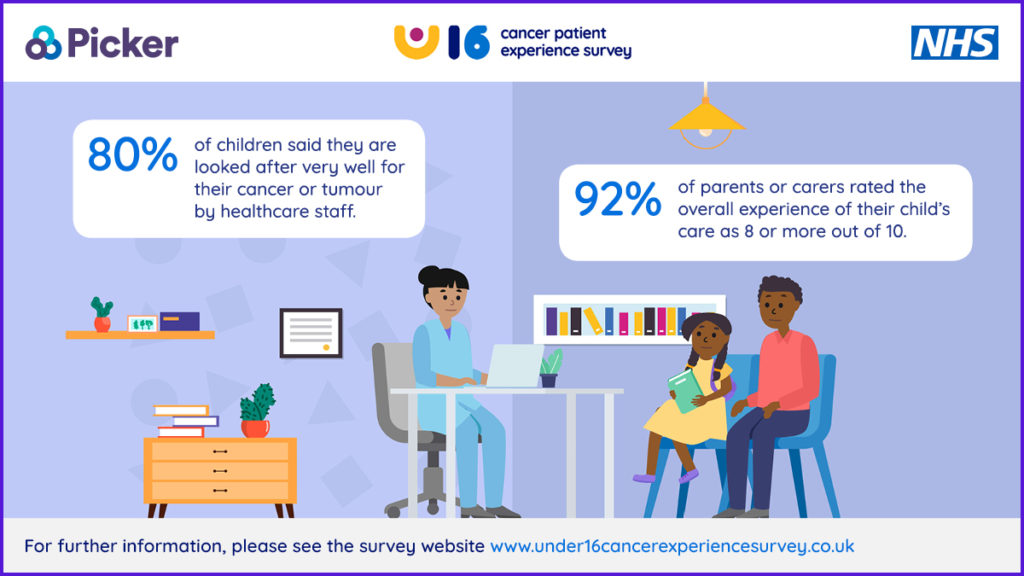Understanding and improving the care experiences of children with cancer
Adult cancer patient experiences have been explored annually since 2010 as part of the National Cancer Patient Experience Survey. The programme is commissioned by NHS England and Improvement and supported nationally by an expert Advisory Group which includes those with lived experience of cancer.
National cancer care experience surveys are invaluable, but up until now they have always focused on adults. That is why the Under 16 Cancer Patient Experience Survey in England launched in 2021 by Picker is an exciting development.
The survey provides national data across England as well as local data to specific NHS children’s cancer care providers (known as Principal Treatment Centres). It gives insight into people’s experiences of cancer and tumour care, identifies where there is room for improvement and enables performance to be tracked over time.
The groundbreaking survey is designed to understand the experiences of cancer care among children and their families. Capturing the views of both children and their parents or carers was vitally important.
The results were published on 27th October 2021 and are available on the survey website. They will help identify priority areas for improvement in children’s cancer services. Crucially, it will also help NHS England and Improvement to understand how it can best deliver person centred care for children with cancer.
To ensure the Under 16 Cancer Patient Experience Survey provides quality insights, an expert Advisory Group meets every three months to discuss the survey methods. The group consists of children with cancer, parents, people who provide cancer and tumour care in hospitals and other areas of the NHS, university researchers and cancer charities such as Young Lives vs Cancer (formerly CLIC Sargent) and Anthony Nolan.
Survey design is critical. To ensure the content of the survey focused on what is important to children with cancer and their parents, focus groups and interviews were conducted to understand care pathways and priorities. We decided to create three surveys to accommodate the design preferences of different age groups. The surveys were tested thoroughly with children and parents to ensure the question wording and overall design was appropriate. For example, checking that questions were understood and asked in the right way. During this process, the questions were refined based on feedback.
The survey achieved a 35% response rate (there were 1,144 respondents out of a total of 3,308 eligible parents and children who were sent a survey). Of these, 619 responses were from parents/carers of children aged 0-7, 260 were from children aged 8-11 and their parents, and 265 were from children aged 12-15 and their parents.
The survey results enable us to understand the extent to which children’s cancer care is person centred. For example, of the respondents across England:
- 86% of parents or carers said that staff always treated them with empathy and understanding
- 89% of children aged 8-15 said that staff were always friendly
- 69% of children aged 8-15 felt that staff always spoke to them in a way they could understand. Older children were more likely to report this (76% of those aged 12–15 compared to 63% of those aged 8-11)
- Most parents or carers (87%) were given information by hospital staff about charities they could talk to about their child’s cancer or tumour. This was true for 77% of children aged 8-15

A further summary of results is available in our infographic.
Although many of the results are positive, the survey has identified room for improvement. NHS England and Improvement and Picker are hosting a series of workshops to support Principal Treatment Centres understanding their results and planning for the future. A national webinar was also run, watch it now.
Our work into the survey development ensures findings are meaningful and can help improve the aspects of care that matter the most to children with cancer across England. Hearing from patients and learning about their experiences is particularly important for this group who go through so much because of their own (or their child’s) diagnosis and treatment. It is important to make sure that children with cancer can continue to live as much of a normal childhood as possible. We owe it to them to give them a voice, listen carefully and put in place changes to ensure the care children with cancer receive is the best possible care.

